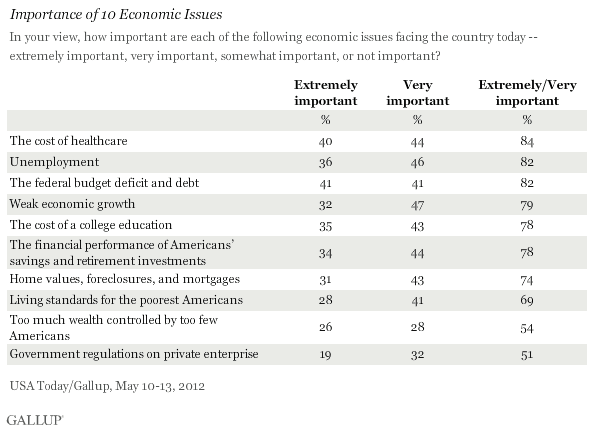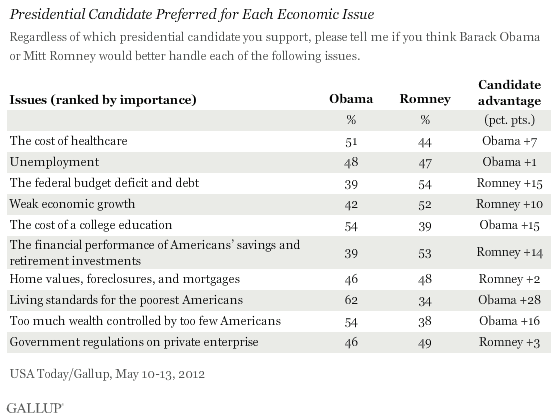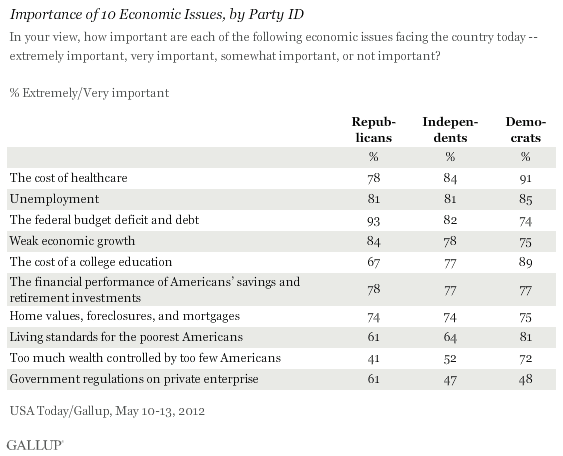PRINCETON, NJ -- Americans see the cost of healthcare, the federal budget deficit, and unemployment as the most important economic issues facing the country today, according to a new USA Today/Gallup poll asking them to rate the importance of 10 such issues. More than 80% rate each of the top three issues as extremely or very important. Americans prefer President Obama over Mitt Romney for handling healthcare, while Romney is favored on the deficit and the two are about tied on unemployment.

At least seven in 10 Americans rate four other issues as extremely or very important: weak economic growth, the cost of a college education, the financial performance of savings or retirement investments, and home values/foreclosures/mortgages. Of these, Romney has a significant edge over Obama in voter confidence for how he would handle weak economic growth as well as the financial performance of personal investments. Obama has a sizable advantage on college costs, and the two are roughly tied on handling home values and financing issues.

Obama has a 28-percentage-point advantage over Romney -- the largest for any issue in the poll -- in Americans' perceptions of which candidate, as president, would better handle living standards for the poorest Americans. However, with 69% rating this extremely or very important, it is a somewhat lower priority for Americans than the top tier of issues.
Obama also does well in perceptions of who can better handle the concentration of wealth in the country -- an issue Obama is heavily invested in politically, with his support for the so-called Buffett rule and his broader call for raising taxes on the wealthy. However, only the slight majority of Americans, 54%, view this as a highly important economic issue.
Obama and Romney are closely matched for handling government regulations on private enterprise. This is a common political touchstone for Romney and other Republicans, but something barely half of Americans, 51%, see as highly important.
Partisans Largely Identify Same Economic Issues as Most Important
When it comes to Americans' top three issues, Republicans put a little more emphasis than Democrats on the federal budget deficit, and Democrats put a little more emphasis than Republicans on healthcare costs, while the two parties have similar perceptions about unemployment. Overall, large majorities of both groups consider all three of these issues highly important.
Among the lower-ranking issues, weak economic growth is uniformly rated by the party groups as highly important. However, more Democrats than Republicans rate college costs (89% vs. 67%, respectively) and the living standards of poor Americans (81% vs. 61%) as highly important issues. Republicans are more concerned than Democrats about government regulations on private enterprise (61% vs. 48%).
The widest partisan gap in the poll is seen in ratings of the concentration of wealth, with 72% of Democrats rating it extremely or very important, compared with 41% of Republicans.
Independents' views are close to the national averages, with large majorities calling healthcare, the federal budget deficit, and unemployment highly important, but closer to 50% seeing the concentration of wealth and government regulation as highly important.

Bottom Line
Unless the U.S. economy suddenly takes off, the next president will likely be expected to juggle a number of challenging economic problems, just as President Obama has strived to do since he took office. Americans see the most important of these as healthcare costs, the federal budget deficit, and unemployment. However, neither Obama nor Romney is perceived as superior on all three. Rather, Americans see Obama as better for healthcare costs, see Romney as better for the deficit, and have no clear candidate preference when it comes to unemployment.
This overall split decision actually extends to all 10 issues measured in the poll, with Romney favored by a significant margin on three issues and Obama on four, while the two are about tied on three others.
If the candidates decide to emphasize their perceived issue strengths with voters, Romney will be talking most about the deficit, economic growth, and improving conditions for savings and other investments. Obama will be talking about healthcare costs, college costs, and achieving greater economic fairness for poor and rich alike. However, when factoring in the priorities of political independents -- the group most likely to determine who wins in November -- the candidates may want to emphasize their ability to address the top-tier economic concerns and downplay attention to the more partisan-oriented issues of redistributing wealth and reducing government regulation, as these may detract from a winning message. Notably, unemployment and housing are highly important economic issues to Americans, but neither candidate holds an advantage on them -- making these opportunity issues for both candidates.
Track every angle of the presidential race on Gallup.com's Election 2012 page.
Survey Methods
Results for this USA Today/Gallup poll are based on telephone interviews conducted May 10-13, 2012, with a random sample of 1,012 adults, aged 18 and older, living in all 50 U.S. states and the District of Columbia.
For results based on the total sample of national adults, one can say with 95% confidence that the maximum margin of sampling error is ±4 percentage points.
Interviews are conducted with respondents on landline telephones and cellular phones, with interviews conducted in Spanish for respondents who are primarily Spanish-speaking. Each sample includes a minimum quota of 400 cell phone respondents and 600 landline respondents per 1,000 national adults, with additional minimum quotas among landline respondents by region. Landline telephone numbers are chosen at random among listed telephone numbers. Cell phone numbers are selected using random-digit-dial methods. Landline respondents are chosen at random within each household on the basis of which member had the most recent birthday.
Samples are weighted by gender, age, race, Hispanic ethnicity, education, region, adults in the household, and phone status (cell phone only/landline only/both, cell phone mostly, and having an unlisted landline number). Demographic weighting targets are based on the March 2011 Current Population Survey figures for the aged 18 and older non-institutionalized population living in U.S. telephone households. All reported margins of sampling error include the computed design effects for weighting and sample design.
In addition to sampling error, question wording and practical difficulties in conducting surveys can introduce error or bias into the findings of public opinion polls.
View methodology, full question results, and trend data.
For more details on Gallup's polling methodology, visit www.gallup.com.
